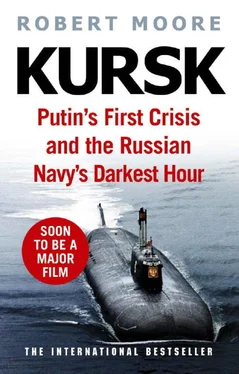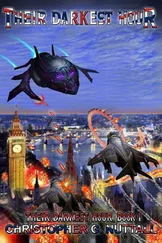There was also an operational reason for a more extensive exercise. Training was essential in advance of a deployment of Russian warships to the Mediterranean later in the year, projected as the boldest Russian naval activity since the end of the Cold War. The imminent exercise to prepare for this deployment would involve low-level air strikes against surface ships, missile firings from warships, and a third phase that would test the tactical skills of submarine commanders. The training would culminate with the submarines executing ambushes and launching torpedo attacks. The Peter the Great , the Northern Fleet’s cruiser and flagship, would steam through the exercise area and act as the main target.
The leadership of the Northern Fleet in the summer of 2000 was in the hands of just two men, both larger-than-life submariners widely respected by their own sailors and officers. They were not naval bureaucrats from Moscow. They had earned their position and rank the hard way, excelling on long voyages and on dangerous missions.
Admiral Viacheslav Popov is a craggy-faced, chain-smoking commander who likes to remind people that if the durations of all his submarine patrols are added together, he has spent a total of eight years under the sea. Almost all his time has been with the Northern Fleet. His only other naval experience was a few months in 1996 as the third-ranking officer of the Baltic command. He laughs at the memory of being called back to the Kola Peninsula after that brief assignment. ‘I arrived back in Murmansk. It was minus eighteen degrees Celsius; there was an Arctic blizzard; the wind was ferocious. I knew I had arrived home.’ Those who know him best say that there are two parts to his love affair with the Navy: the Northern Fleet and the submarine flotillas.
Popov occupies a unique status within the Russian military, not only because of the length of his service as a submarine commander but also because he is part of a legendary naval family. Both his younger brothers are also senior submarine officers. Captain Alexei Popov serves under his older brother at the staff headquarters of the Northern Fleet, and Vladimir Popov, the youngest of the three, commands a naval training college on the Black Sea.
Admiral Popov’s staff officers say that he cannot be bribed – a remarkable tribute in the new Russia. Popov is proud, emotional and patriotic. He wears the Order of the Red Star and the Order of the Motherland prominently. He also insists on bringing along to naval parades his six-year-old grandson, Slava, wearing his own little uniform. But the sentimental side of Popov does not disguise his deep dismay at the state of his beloved Fleet or the suppressed fury that the American and British navies have turned his home waters into their intelligence playground. For Popov, the extent of Western submarine espionage around the Kola Peninsula is a constant reminder of Russia’s naval decline.
His deputy is Vice Admiral Mikhail Motsak, a former commander of attack submarines, who won the title Hero of Russia for a famed patrol under the North Pole. As the Northern Fleet’s chief of staff, Motsak had direct responsibility for planning the summer exercise. Privately, some senior naval staff officers grumbled that the manoeuvres were a charade. Moscow liked to pretend that the Fleet was a major naval presence, when in reality it barely had the resources to act as a coastal defence force. Only the nuclear submarines possessed global importance, and that was because the ballistic missiles could reach their targets without the boats leaving the Barents Sea. The idea of projecting power into foreign oceans struck those who knew the Fleet best as hopelessly over-ambitious, a fantasy drawn from the world of Potemkin, where everything was dressed up to impress a new tsar.
Charade or not, that August’s naval exercise featured a clever twist, a tribute to Russian cunning and to the abilities of Admiral Popov. The plan, known to only a handful of the most senior Russian naval planners and strategists, was to use the exercise as a smoke-screen. Under the disguise of the war games, one of the Northern Fleet missile submarines – a boomer, fully armed with her nuclear missiles – would attempt to sneak out of her home port and slip under the summer ice, undetected by the Americans. Russian admirals use the pristine Arctic world as a place to hide their submarines from American surveillance.
The plan had Popov’s fingerprints all over it. He made his name as a commander of ballistic-missile submarines who prided himself on an ability to outfox the Americans. He believed that the American spy submarines would be drawn to the exercise like bees to honey. If the Americans fell for the trick and decided to monitor the missile and torpedo firings, that would leave a crucial gap in their surveillance of the route up to the icepack. The routine August naval manoeuvres were important in their own right, but of much greater strategic significance was this question of whether Russia could deploy its missile submarine without being trailed. Many ruses had been used in the past, such as Russian submarines following in the wake of a large merchant ship, hoping the acoustic disturbance would disguise the submarine’s presence, and the stakes behind such diversionary games have always been high. In a war, detection can mean destruction, and destruction of the entire SSBN fleet would represent the loss of Russia’s strategic nuclear reserve.
For many years now, the Russians have excelled in under-ice submarine operations. Throughout the Cold War, they studied the unique oceanography and acoustics of the Arctic, learning how best to exploit the conditions to compensate for the superior sonar technology of the American boats. Under the thick pack ice, the odds favour the submarine trying to hide, not those pursuing her. She is invulnerable to detection from aircraft and satellite reconnaissance. No sonar buoys can be dropped into the water to try to track her. In addition, the sophisticated American seabed sensors that are deployed in other ocean areas are very difficult to install and maintain under the ice. Furthermore, the water is extremely tranquil; there are no waves, no shipping and very little marine life. The result is that any approaching US attack submarine can be detected. But there is a very obvious problem: an SSBN is unable to fire her missiles through thick ice. The icepack may be a good place under which to hide, but it is no place to be when war breaks out.
Instead, the Russian submarine fleet has learned to operate patrols in another part of the Arctic waters, an area known as the Marginal Ice Zone (MIZ). Here, open patches of water vie with slabs of ice, and some of the most complex games of hide-and-seek between Western and Russian boats are played out. The MIZ is a totally different acoustic environment in comparison to the world under the pack ice. The ocean here is filled with noise: it is rich with marine life and crackles with the sounds of colliding ice floes. The seals and whales, the walruses and other marine mammals, combine to produce a cacophony that confuses the spy submarines. The Russian boats have the opportunity to use these background acoustics to hide from the American hunters while still having sufficient open water through which to fire their ballistic missiles.
The American and Russian admirals want this games-manship to be a private affair, part intelligence gathering, part probing and testing, part psychological warfare. The quiet dance, the elaborate choreography of rival submarine operations in Russia’s Arctic seas, goes on to this day, invisibly, as it has for half a century.
II: 8 a.m., SATURDAY, 12 AUGUST
Southern Barents Sea
For forty-eight hours, from early on Thursday, 10 August, until Saturday, the Northern Fleet exercise went broadly according to plan, although there were a number of highly visible technical problems and weapons failures. Several surface warships fired missiles at target barges over the horizon to test the launch systems and the crew training. The Peter the Great ’s first firing went spectacularly wrong, an SS-N-19 missile crashing into the sea a short distance from the ship. Engine failure was suspected, since commanders deliberately chose to use their oldest missiles first. The second launch went much better, the dummy warhead landing extremely close to the target, near enough for the observers in patrol boats to describe it as a ‘complete success’.
Читать дальше












